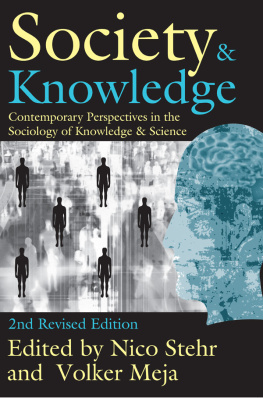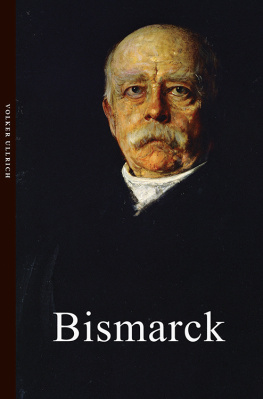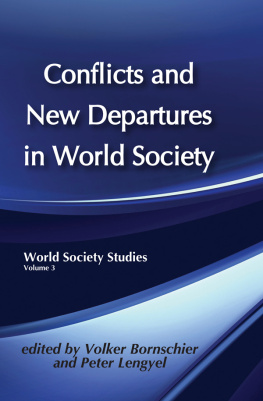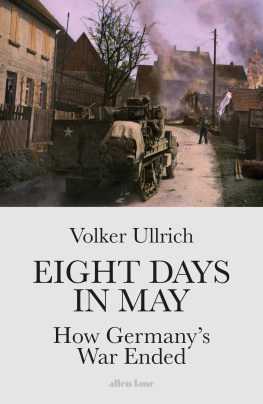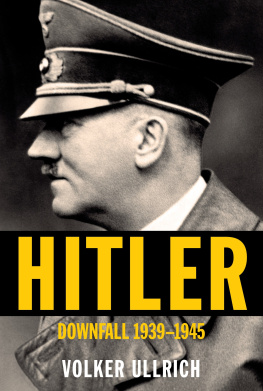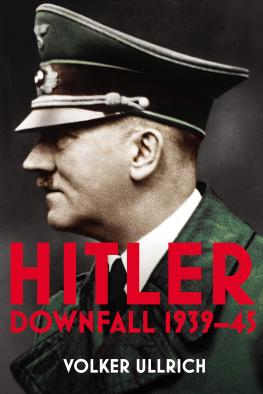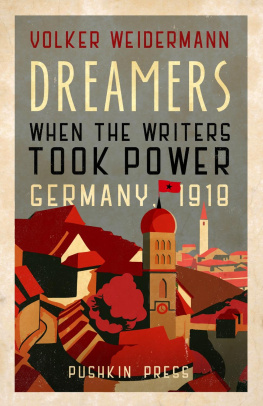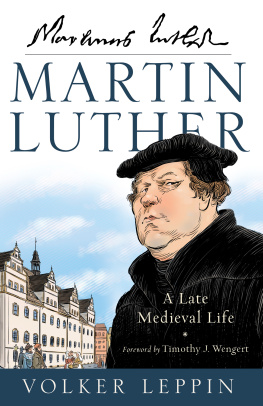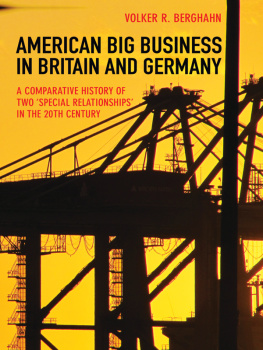ROUTLEDGE LIBRARY EDITIONS:
GERMAN HISTORY
Volume 2
GERMANY IN THE AGE OF TOTAL WAR
GERMANY IN THE AGE OF TOTAL WAR
Edited by
VOLKER R. BERGHAHN
AND MARTIN KITCHEN
First published in 1981 by Croom Helm Ltd.
This edition first published in 2020
by Routledge
52 Vanderbilt Avenue, New York, NY 10017
and by Routledge
2 Park Square, Milton Park, Abingdon, Oxon OX14 4RN
Routledge is an imprint of the Taylor & Francis Group, an informa business
1981 Volker R. Berghahn and Martin Kitchen
All rights reserved. No part of this book may be reprinted or reproduced or utilised in any form or by any electronic, mechanical, or other means, now known or hereafter invented, including photocopying and recording, or in any information storage or retrieval system, without permission in writing from the publishers.
Trademark notice: Product or corporate names may be trademarks or registered trademarks, and are used only for identification and explanation without intent to infringe.
British Library Cataloguing in Publication Data
A catalogue record for this book is available from the British Library
ISBN: 978-0-367-02813-8 (Set)
ISBN: 978-0-429-27806-8 (Set) (ebk)
ISBN: 978-0-367-22846-0 (Volume 2) (hbk)
ISBN: 978-0-429-27719-1 (Volume 2) (ebk)
Publishers Note
The publisher has gone to great lengths to ensure the quality of this reprint but points out that some imperfections in the original copies may be apparent.
Disclaimer
The publisher has made every effort to trace copyright holders and would welcome correspondence from those they have been unable to trace.
Germany in the Age of Total War
Edited by
VOLKER R. BERGHAHN AND MARTIN KITCHEN
1981 Volker R. Berghahn and Martin Kitchen
Croom Helm Ltd, 210 St Johns Road, London SW11
British Library Cataloguing in Publication Data
Germany in the age of total war.
1. Germany History 19181933 Addresses, essays, lectures
2. Germany History 19331945 Addresses, essays, lectures
3. Germany History Allied occupation, 1945 Addresses, essays, lectures
I. Kitchen, Martin
943.086 DD235
ISBN 0-7099-0119-4
First published in the USA 1981 by
Barnes & Noble Books
81 Adams Drive,
Totowa, New Jersey, 07512
ISBN 0-389-20186-3
Printed and bound in Great Britain by
Biddles Ltd, Guildford and Kings Lynn
ESSAYS IN HONOUR OF FRANCIS CARSTEN
CONTENTS
Francis Carsten: Politics and History in Two Cultures
Volker R. Berghahn
The Topos of Inevitable War in Germany in the Decade before 1914
Wolfgang J. Mommsen
Walther Rathenau Intellectual or Industrialist?
James Joll
Poles, Czechoslovaks and the Jewish Question, 19141921: A Comparative Study
Antony Polonsky and Michael Riff
War and the Appropriation of Nature
George L. Mosse
Rapallo Strategy in Preventive Diplomacy: New Sources and New Interpretations
Hartmut Pogge von Strandmann
The Baltic Problem in Weimars Ostpolitik, 19231932
John W. Hiden
Paramilitarism and Social Democracy: Theodor Krner and the Schutzbund
Martin Kitchen
Democracy and the Power Vacuum: The Problem of the Party State during the Disintegration of the Weimar Republic
Karl Dietrich Bracher
The Third Reich and the Problem of Social Revolution: German Officers and the SS
Gunnar C. Boehnert
German Reactions to Military Defeat, 19451947: The British View
Barbara Marshall
The Missing Revolution in Industrial Societies: Comparative Reflections on a German Problem
Richard Lwenthal
PREFACE TO NEW EDITION
When Routledge approached us earlier this year about a reissue of Germany in the Age of Total War, we were understandably vexed by doubts about the viability of their proposition. Would it be worthwhile to publish a book again that first appeared in 1981? So, we began to re-read the articles and in the end decided, for a number of considerations, to go along with the publisher. To begin with, some of the contributions were by historians and social scientists whose publications can still be found in the lists of required or suggested reading of many courses in modern German history and their names continue to be well-known in the community of scholars. There was also the intriguing question of how far the arguments and positions that contributors had presented several decades ago had been overtaken by subsequent research and how far the insights they had provided still deserve serious consideration not only by historians and their preoccupation with the past, but also for the present situation of the Europeans and their institutions more generally.
As the original purpose of this volume had been the honouring of Francis L. Carsten as an eminent scholar in his time, the first edition began with an account of his life and work; at the same time there was no preface that attempted to introduce the larger aims of this anthology beyond the fact that all contributors were Carstens colleagues, students or friends. With Routledge determined to reissue the volume, we felt that a Preface was needed to give readers an indication of why this collection of essays would, in our estimation, be a worthwhile read even today. To us it seemed to pinpoint problems that are still being researched and pondered by historians. So, let us turn to individual contributions to test these introductory hypotheses.
The first essay is by the renowned German historian Wolfgang Mommsen who, apart from his interest in the sociologist Max Weber, made the Hohenzollern Empire up to 1918 his specialty. Consequently, he also became a major voice in the debates on the origins and course of World War I at the time when the Hamburg historian Fritz Fischer again raised the question of responsibility for the outbreak of that conflict. It was perhaps inevitable that this question would be widely discussed again in 2014 on the occasion of the centenary of what is generally regarded as the elementary catastrophe of the twentieth century. This discussion was greatly stimulated when the Cambridge historian Christopher Clark published his book on the July Crisis of 1914 in which he argued that Europes decision-makers had sleepwalked into the war and that their bumbling had made it difficult to determine responsibilities as clearly as Fischer had postulated. Clarks distribution of the burden of guilt more or less evenly among the great powers, but also on the Serb leadership caused, not surprisingly, a pushback by historians on both sides of the Atlantic and especially in Germany, as reflected in the 2017 collection of essays, edited by Andreas Gestrich and Hartmut Pogge von Strandmann and entitled Bid for World Power? New Research on the Outbreak of the First World War.
It is in this context that Mommsens essay gains renewed significance in that he shows that there was a growing sense in pre-1914 Germany that a major war was bound to hit Europe sooner or later. Mommsen traces the evolution of the expectation first at the level of the press and among intellectuals and nationalist associations. He also demonstrates how Reich chancellor Theobald von Bethmann Hollweg became increasingly worried about this aggressive agitation and yet found it impossible to stop it. Worse, the German generals became convinced that, if there was to be a major war, it should be unleashed before the Russian and French rearmament programs were completed by 1916. Mommsen examines this notion of a major confrontation before it was too late and hence of the inevitability of a preventative war for which his piece contains a good deal of empirical evidence. Accordingly, his arguments have been taken up again by critics of Clarks book on




